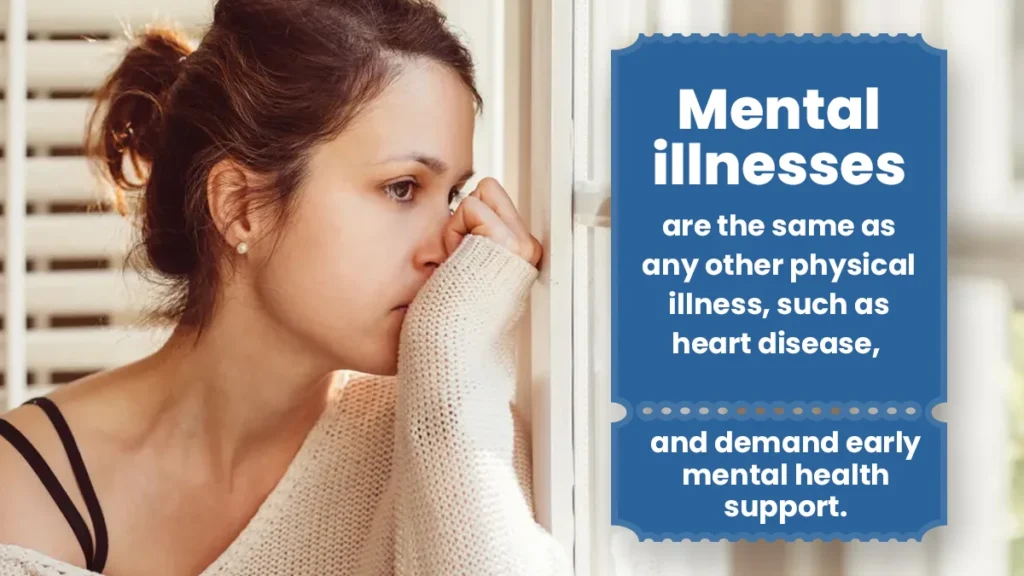In today’s society, myths about mental health persist, hindering understanding and support for those facing mental health challenges. Debunking these misconceptions is crucial for fostering empathy and encouraging individuals to seek help without judgment.
This article delves into the most common myths surrounding mental health, shedding light on the realities that often elude public awareness. In addition, it will provide insights on how to offer meaningful support to those struggling with severe mental illnesses.
Key Takeaways
Understanding mental health myths is crucial for fostering empathy and support in our communities. Here is what you need to know:
- Mental health illnesses are genuine medical conditions that affect thoughts, emotions, and behaviors, demanding empathy and support.
- Dispelling these myths is vital to combat stigma, encourage open conversations, and create a more compassionate society.
- Debunking myths like “mental illness is not real” dismantles stereotypes and fosters a culture of empathy.
- Offering patient, non-judgmental support and encouraging professional help is vital for those facing mental health challenges.
Take a positive step towards mental well-being; contact The Haven Detox-Little Rock at (501) 271-3342 for compassionate and professional mental health treatment.
Understanding Mental Illnesses
Mental illnesses, often referred to as mental health disorders, encompass a range of conditions affecting thoughts, feelings, and behaviors. These conditions can significantly impact an individual’s daily life, relationships, and overall well-being.
Mental illnesses are not character flaws but are rooted in the complex interplay of genetic, biological, environmental, and psychological factors. They can manifest in various forms, such as anxiety, major depression, panic attacks, bipolar disorder, schizophrenia, and others; each condition presents unique symptoms, which may include persistent sadness, excessive worry, mood swings, high blood pressure, and suicidal thoughts.
Seeking help is vital. Professional intervention, including therapy like cognitive behavioral therapy (CBT), medications, and support networks, is pivotal in managing and alleviating symptoms. Encouraging open conversations, reducing stigma, and fostering understanding are key steps in building a society where individuals with mental health problems can thrive.
Debunking Mental Health Myths: Why It Matters
Misconceptions surrounding mental health can have profound effects on individuals and society as a whole. By dispelling these myths, we pave the way for a more empathetic and informed understanding of mental well-being.
Effects of Mental Health Myths on Society
Misinformation about mental health contributes to the perpetuation of stigma, hindering open conversations and support networks. This lack of understanding can lead to discrimination, social isolation, and barriers to seeking help. Dispelling myths is crucial for creating a society where mental health is regarded as important as physical health, fostering a culture of compassion and acceptance.
Impact on Individuals with Mental Illness
For those with mental health challenges, myths can worsen feelings of shame and self-judgment, leading to an increased risk of substance use as a coping mechanism. Believing in these misconceptions may prevent individuals from seeking help, leading to delayed or inadequate treatment. By debunking myths, we empower individuals to recognize the legitimacy of their struggles, fostering an environment where they feel supported, understood, and encouraged to prioritize their mental well-being.
By actively challenging and correcting misinformation, we contribute to the well-being of those directly affected and cultivate a more compassionate and informed community.
Common Mental Health Myths: A Look at the Facts

Understanding and dispelling myths about mental health is crucial for fostering a supportive and informed society. Let’s debunk some popular misconceptions that persist and hinder the well-being of individuals dealing with mental health challenges.
Myth 1: Mental Health Illness is Not Real
Contrary to popular belief, mental health illnesses are very real. They’re not just “in someone’s head.” These conditions affect thoughts, emotions, and behaviors, impacting daily life. Accepting the reality of mental health struggles is the first step towards understanding and supporting those who may be experiencing them.
Myth 2: People with Mental Health Illness are Violent
This myth is far from accurate. Research shows that the majority of people with mental health conditions are not prone to violent acts. In fact, they are more likely to be victims of violence rather than perpetrators. It’s essential to dispel this misconception and foster empathy instead of fear.
Myth 3: Mental Health Illness Makes People Weak
Mental health challenges are not a sign of weakness. They can affect people of all ages, including young children, adults, and old, regardless of their strength or character. It takes courage to confront and address mental health issues. Seeking help and support is a strength, demonstrating resilience and a commitment to well-being.
Myth 4: Mental Health Illness is a Life Sentence
Mental health struggles do not equate to a life sentence. With the proper treatment, support, and coping mechanisms, many individuals experience improvement in their mental health. Recovery is possible, and it’s essential to convey that mental health services can help lead to a brighter future.
By challenging these common misconceptions about the most common mental health problems, we contribute to creating a more informed and empathetic society that supports the well-being of all its members.
Empathy in Action: Supporting Those with Mental Illness
Supporting someone with a mental health illness is crucial for their well-being, and understanding the right approach is key to offering meaningful assistance.
The Do’s and Don’ts When Talking about Mental Health
Here are some Do’s:
- Listen Without Judgment: Provide a non-judgmental space for individuals to express their feelings and experiences.
- Educate Yourself: Take the time to learn about their mental health conditions, fostering empathy and understanding.
- Offer Practical Help: Assist with daily tasks or accompany them to appointments, showing tangible support.
- Encourage Professional Help: Encourage them to seek professional assistance and offer assistance in finding suitable resources.
- Be Patient: Understand that recovery is a process, and your consistent support can make a significant impact.
Here are some Don’ts:
- Avoid Stigmatizing Language: Refrain from using stigmatizing terms or dismissing their experiences.
- Minimize Their Struggles: Avoid downplaying their challenges or suggesting they can simply “snap out of it.”
- Force Solutions: Respect their autonomy by not imposing solutions; instead, offer options and support their choices.
- Disregard Self-Care: Encourage self-care practices and emphasize the importance of their well-being.
Offering Support to Loved Ones
Supporting loved ones with mental health disorders requires a blend of compassion and practical assistance.
- Express Your Support: Let them know you’re there for them and willing to help in any way possible.
- Encourage Open Communication: Create a safe space for open conversations about their mental health, allowing them to share without fear of judgment.
- Participate in Their Journey: Attend therapy sessions or support groups together, reinforcing your commitment to their well-being.
- Respect Boundaries: Acknowledge their need for personal space and autonomy in their recovery journey.
- Celebrate Progress: Recognize and celebrate small victories, fostering a positive and encouraging environment.
Following these guidelines can create a supportive network that aids individuals in their mental health journey.
Frequently Asked Questions (FAQ)
Does poor mental health affect our day-to-day life?
Poor mental health significantly affects day-to-day life. It can disrupt routines, hinder productivity, and strain social relationships. Emotions may become overwhelming, making it challenging to navigate even simple tasks. Recognizing and addressing mental health is crucial for a balanced and fulfilling daily experience.
Where do people go when they have bad mental health?
When individuals face challenges with their mental health, they often turn to various resources. Common avenues include reaching out to mental health professionals such as therapists or counselors, confiding in friends or family members, or contacting helplines and support groups. Seeking assistance is a crucial step toward improving mental well-being.
Can therapy and self-care activities be a cure for all mental illnesses?
While therapy and self-care activities are beneficial, they aren’t a one-size-fits-all cure for all mental illnesses. They are crucial in managing and improving mental health, but their effectiveness varies. A comprehensive approach often includes a combination of effective treatments tailored to individual needs.
The Haven Detox-Little Rock: Where Healing Takes Root
Struggling with mental health doesn’t define you; it’s a medical condition that can touch people from all walks of life. Remember, you’re not alone, and help is within reach. The Haven Detox-Little Rock is here to support you on your journey to healing.
Our dedicated team of medical professionals provides expert mental health treatment in a safe and supportive residential rehab setting. We use evidence-based treatments to help you manage and overcome the symptoms of mental illness and substance use disorder (SUD).Take the vital first step toward a healthier, productive life by calling us at (501) 271-3342. Your well-being matters, and we’re here to guide you through the process.





